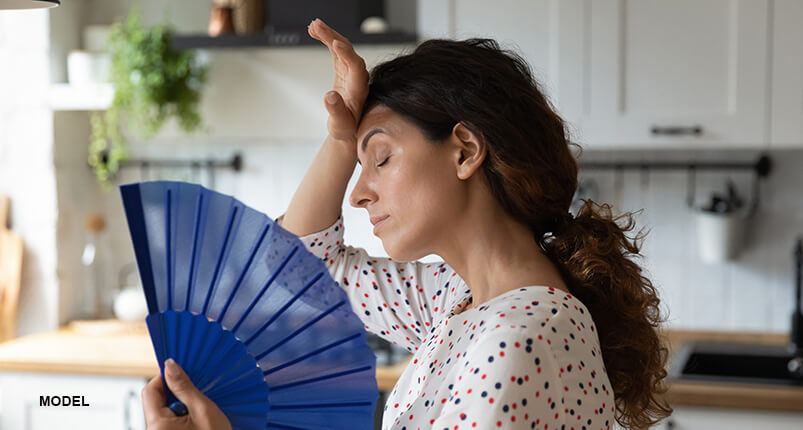The Heat is On: How Hot Weather Affects the Skin

As temperatures rise, so do the challenges our skin faces. Hot weather can trigger various skin issues, from increased oil production to dehydration and even inflammation. Understanding these effects is crucial to maintaining a healthy complexion during the warmer months.
How Heat Affects the Skin
Increased Sweat Production and its Impact
Sweating is the body’s natural cooling mechanism, but excessive perspiration can lead to clogged pores, breakouts, and even skin irritation. When sweat mixes with bacteria and oils on the skin, it can contribute to acne and fungal infections. A study published in the Journal of Clinical and Aesthetic Dermatology highlights that prolonged exposure to sweat-soaked clothing increases the risk of skin infections and rashes.
Dehydration and its Effect on Skin Texture and Health
Hot weather accelerates water loss through sweat, leading to dehydration. Dehydrated skin appears dull, rough, and more prone to fine lines. The American Academy of Dermatology (AAD) warns that dehydration impairs the skin barrier, making it more susceptible to environmental aggressors like pollution and UV rays.
Heat-induced Inflammation and Vascular Changes
High temperatures cause blood vessels to dilate, leading to increased redness and swelling. This is especially problematic for individuals with rosacea or sensitive skin. Heat can also trigger histamine release, exacerbating inflammatory skin conditions like eczema and hives.
Common Skin Issues Triggered or Worsened by Heat
Heat Rash (Miliaria): Causes, Symptoms, and Risk Factors
Heat rash occurs when sweat gets trapped in blocked sweat ducts, leading to red, itchy bumps. It is common in humid climates and affects individuals who sweat excessively. Keeping the skin cool and dry is essential in preventing this condition.
Acne Flare-ups: How Heat, Sweat, and Excess Oil Clog Pores
Hot weather increases sebum production, and when combined with sweat and bacteria, it creates the perfect environment for acne breakouts. A study in Dermatology and Therapy found that acne worsens during the summer due to increased humidity and sun exposure.
Sunburn and Photosensitivity: UV Exposure Risks in Hot Climates
The sun’s UV rays are more intense in hot weather, increasing the risk of sunburn and long-term skin damage. UV exposure can break down collagen, accelerate aging, and increase skin cancer risk. According to the Skin Cancer Foundation, five or more sunburns double the risk of developing melanoma.
Hyperpigmentation: Heat’s Role in Triggering Melasma and Dark Spots
While UV rays are the primary cause of hyperpigmentation, heat alone can also trigger melasma by stimulating melanocytes, the pigment-producing cells in the skin. A study published in JAMA Dermatology found that heat exposure, independent of UV light, can exacerbate dark spots.
Dry, Dehydrated Skin: The Paradox of Moisture Loss Despite Sweating
Although sweating might make the skin feel moist, it actually accelerates water loss. This leads to dehydrated skin, which appears flaky and irritated. Proper hydration and the use of humectants like hyaluronic acid can help maintain skin moisture.
Rosacea Flare-Ups: How Heat Exacerbates Redness and Irritation
People with rosacea often experience increased flushing and sensitivity during hot weather. Heat dilates blood vessels, causing redness and discomfort. The National Rosacea Society recommends avoiding extreme temperatures and using cooling skincare products to manage symptoms.
Fungal and Bacterial Infections: Warm, Moist Environments Promoting Growth
Hot and humid conditions create an ideal breeding ground for fungi and bacteria. Common infections include athlete’s foot, ringworm, and bacterial folliculitis. Wearing breathable clothing and maintaining good hygiene can help prevent these infections.
How to Mitigate the Effects of Heat on Your Skin
Stay Hydrated: Importance of Internal Hydration
Drinking plenty of water helps maintain the skin’s moisture balance. Electrolyte-rich beverages can replenish lost minerals and prevent dehydration.
Use Lightweight, Non-Comedogenic Skincare Products
Switching to oil-free, water-based products helps prevent clogged pores. Look for ingredients like niacinamide, which regulates sebum production without stripping moisture.
Sun Protection Strategies: Broad-Spectrum SPF and Reapplication Tips
A broad-spectrum SPF of at least 30 should be applied daily, even on cloudy days. Reapply sunscreen every two hours and after sweating or swimming. Mineral sunscreens with zinc oxide provide effective protection without irritating sensitive skin.
Wear Breathable Clothing: Reducing Friction and Trapping of Sweat
Loose, moisture-wicking fabrics like cotton and bamboo help prevent heat rash and irritation. Avoid synthetic materials that trap sweat and heat.
Cool Down Techniques: Using Mists, Cold Compresses, or Seeking Shade
Facial mists with ingredients like aloe vera or thermal water can soothe overheated skin. Cold compresses and seeking shade during peak sun hours also reduce heat-related inflammation.
Cleansing Routine: Importance of Washing Off Sweat and Pollutants
Cleansing twice a day with a gentle, sulfate-free cleanser helps remove sweat, dirt, and bacteria. Avoid harsh exfoliants that can strip the skin barrier.
Barrier Repair: Moisturizers That Help Retain Skin Hydration
Look for moisturizers with ceramides, glycerin, and hyaluronic acid to reinforce the skin barrier and lock in hydration. Gel-based formulas work well in hot weather without feeling greasy.
When to Seek Medical Advice
Certain heat-related skin conditions require professional attention. Seek medical help if you experience:
- Persistent rashes that do not improve with home care
- Severe sunburn with blisters, fever, or chills
- Signs of skin infection, such as pus, redness, or swelling
- Unusual skin changes that persist despite proper skincare
Hot weather presents unique challenges for skin health, from dehydration and acne flare-ups to sunburn and hyperpigmentation. Understanding these effects and taking proactive measures can help keep your skin healthy and radiant throughout the summer months.
